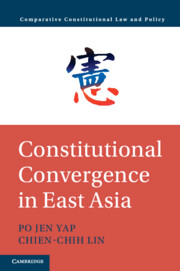Book contents
- Constitutional Convergence in East Asia
- Comparative Constitutional Law and Policy
- Constitutional Convergence in East Asia
- Copyright page
- Contents
- Foreword
- Acknowledgements
- Abbreviations
- 1 Introduction
- 2 Reasons for Convergence
- 3 Convergence on Structured Proportionality
- 4 Convergence on Innovative Constitutional Remedies
- 5 Limits on Convergence
- 6 Conclusion
- Bibliography
- Index
5 - Limits on Convergence
Published online by Cambridge University Press: 18 November 2021
- Constitutional Convergence in East Asia
- Comparative Constitutional Law and Policy
- Constitutional Convergence in East Asia
- Copyright page
- Contents
- Foreword
- Acknowledgements
- Abbreviations
- 1 Introduction
- 2 Reasons for Convergence
- 3 Convergence on Structured Proportionality
- 4 Convergence on Innovative Constitutional Remedies
- 5 Limits on Convergence
- 6 Conclusion
- Bibliography
- Index
Summary
There are limits to this constitutional convergence in East Asia. The three courts in Taiwan, South Korea and Hong Kong will not converge on electoral reform and matters impacting national security. While Taiwan and South Korea are dynamic democracies where competing political parties take turn in office, Hong Kong is a sub-unit of communist China. Therefore, the pursuit of major electoral systemic changes, personnel changes adverse to China’s core interests or challenges that are perceived to undermine national security or sovereignty are simply off-limits to the Hong Kong judiciary.
Keywords
- Type
- Chapter
- Information
- Constitutional Convergence in East Asia , pp. 137 - 171Publisher: Cambridge University PressPrint publication year: 2021

